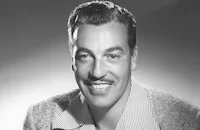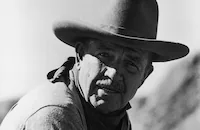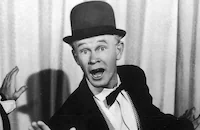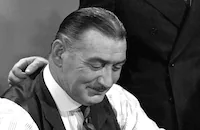Show Them No Mercy!
Brief Synopsis
Cast & Crew
George Marshall
Rochelle Hudson
Cesar Romero
Bruce Cabot
Edward Norris
Edward Brophy
Film Details
Technical Specs

Synopsis
The kidnappers of young Tom Hansen demand $200,000 in unmarked five, ten and twenty dollar bills from the boy's family. The boy's wealthy uncles and a family friend agree to contribute large sums, but they and the boy's father refuse to allow FBI investigators to furnish marked bills to track the criminals. During a thunderstorm, a young married couple, Loretta and Joe Martin, get stuck in mud with their baby Trudy and dog Sport, and find an abandoned house to wait out the storm. The four kidnappers arrive at the house, after having picked up the ransom money and delivered the boy. Tobey, the leader, locks Loretta, Joe, Trudy and Sport in a bedroom. Because Trudy needs medicine for a cold, Tobey dedides to go with Joe to buy the medicine and have Joe pass some of the money in a few nearby towns, so that Joe will be suspected if the money is marked. While they are gone, Pitch, a gang member who was in favor of killing the Martins right off, gets drunk and irritated as the baby cries. When Tobey and Joe do not return at their scheduled time, Pitch points his gun at Gimp, a gang member who sympathizes with the Martins, and demands the key to the bedroom so he can kill them. As Pitch is about to shoot, Tobey and Joe arrive. Irritated at Pitch's drinking, Tobey announces that they passed every bill and will leave in the evening. Meanwhile Reed of the FBI reveals to an assembled group of law enforcement officers that they were secretly able to substitute serially-numbered bills for the Hansen's money and that any bill whose serial number begins with the letters L, M, N, O or P and ends with the numbers 5, 7 or 9 is a ransom bill. This information is broadcast across the country. As the kidnappers prepare to leave, they hear one of the broadcasts and learn that the bills Joe passed have turned up. Although Pitch wants to kill the Martins, Tobey decides they can lay low for maybe a month and then pass the bills far away. While Joe, using Loretta's scissors, tries to enlarge a hole in the bedroom floor leading to a cellar, Sport grabs a piece of Pitch's clothing. Pitch throws a wad of bills at the dog, who then runs outside with the money. As the dog begins to tear up the money, Pitch shoots him. After Pitch runs back to the house, Sport crawls away, leaving some of the torn bills in the open. Tobey then orders the others to leave. Pitch and Buzz, the fourth gang member, pull out before Gimp is ready, leaving him to walk. After Pitch and Buzz pass money at a gas station, a young attendant calls in their license plate, and a roadblock is set up. Buzz is killed, while Pitch, shot in the arm, escapes. Gimp, seeing an ad for a twelve-dollar train ticket to Phoenix, exchanges bills at a few church collection plates, but when he goes to buy the ticket, he finds that the twelve-dollar rate has gone up. After he pays the difference with a marked bill, he is shot as he tries to board the train. At the house, Loretta calls for Tobey to unlock the door so that she can get hot water for the baby. Joe waits to attack Tobey with a scissors, but before Tobey opens the door, Pitch returns and apologizes. When he suggests that he and Tobey use the phony passports that he has in San Francisco to leave the country until everything has settle down, Tobey agrees. Meanwhile, Sport is attended to at a hospital, where he was taken after an old man found him. Reed orders 500 men to the location where the dog was found. As they prepare to leave, Pitch offers to kill the Martins, and Tobey hands over his gun. Pitch, however, shoots Tobey and then kicks in the bedroom door. Joe creates a diversion by running outside so that Loretta can grab the machine gun. After Pitch shoots Joe in the shoulder, Loretta mows Pitch down and then the police arrive. Later Reed tells Joe and Loretta about a reward, while Sport is awarded a medal for heroism.

Director

George Marshall
Cast

Rochelle Hudson

Cesar Romero

Bruce Cabot

Edward Norris

Edward Brophy

Warren Hymer
Herbert Rawlinson
Robert Gleckler
Charles C. Wilson

William Davidson

Frank Conroy
Edythe Elliott
Orrin Burke

William Benedict
Booth Howard
Paul Mcvey
Brady Kline
Harry Hollingsworth
Bud Geary
Lester Dorr

Edward Keane
Otto Hoffman

Wilfred Lucas
Jimmie Butler
Edward Lesaint
Phil Tead
Gregg O'brien
Stanley Blystone
Philip Morris
Stanley King
Lawrence Wheat
Lee Shumway
Grace Goodall
Georgie Cooper
Ray Dawe
Charles Schaeffer
Crew
David Buttolph
Irving Caesar
W. D. Flick
Kubec Glasmon
Bert Glennon
Raymond Griffith
Roger Heman
Ray Henderson
Henry Lehrman
Arthur M. Levy
Harvey Manger
Jack Murray
Jack Otterson
Joseph M. Schenck
Thomas Vincent
Jack Yellen
Darryl F. Zanuck

Film Details
Technical Specs

Quotes
Trivia
Notes
The working title of this film was Snatched!. The film was prepared by 20th Century Pictures before the company merged with Fox Film Corp. Reviews noted that the film was inspired by the kidnapping in May 1935 of George Weyerhaeuser, scion of a wealthy lumber family, who was released after ransom money was paid. The ransom money, which the FBI arranged so that the serial numbers could be used as clues, was then traced, and the kidnappers were arrested and sentenced to long prison terms. For further information on the Weyerhaeuser case, please see the entry above for the 1935 Paramount production, Men Without Names.
According to information in the MPAA/PCA Collection at the AMPAS Library, after Darryl Zanuck, Twentieth Century Pictures Vice-President in charge of production, attended a conference with PCA officials regarding the proposed film, PCA Director Joseph Breen sent Zanuck relevant paragraphs from the PCA's recent annual report regarding new regulations for the treatment of kidnapping in films. According to these regulations, kidnapping could not be the main theme; the person kidnapped could not be a child; no details of the kidnapping could be shown; no profit could accrue to the kidnappers; and the kidnappers must be punished. In a letter dated June 12, 1935, Zanuck stated that the proposed picture would not emphasize or show the kidnapping, but would dramatize the inability of the kidnappers to get rid of the ransom money. He wrote that the film would be "the greatest warning to kidnappers and would-be kidnappers that could possibly be put on the screen or in print" because it would prove that "although a kidnapping is 100% successful, it is folly to pursue because what are you going to do with the money once you get it?" Zanuck's idea of the ending, at this stage, was different from the ending in the final film. In the ending as described by Zanuck, the leader of the kidnappers, the only one not yet arrested, comes to a big city, where he is protected by old friends. However, after G-men relentlessly clamp down on the area, raiding gambling joints and racketeer hideouts, the "friends" kill the kidnapper and throw his body out on the street. This ending bears some similarity to that of M, a 1931 German film written by Fritz Lang and Thea von Harbou and directed by Lang, in which the underworld, hounded by police in their efforts to find a child molester and murderer, condemn the man to execution so that the police will leave them alone. Zanuck agreed to follow the regulations regarding the depiction of kidnapping and raise the age of the boy kidnapped to his early twenties, and the PCA became convinced that the theme of the film was "hot money," rather than kidnapping. According to correspondence in the MPAA/PCA file on the film, Zanuck had a meeting set up with the U.S. Attorney General regarding the film, but Zanuck subsequently was not able to attend. However, Jason Joy, a Twentieth Century-Fox official, traveled to Washington, D.C. and consulted with Justice Department officials concerning the technical phase of the film. According to a New York Times article, the Justice Department approved the script after certain revisions had been made and ordered the studio to make no further changes. The Hays Office objected to the title Snatched! According to a Daily Variety news item, Twentieth Century-Fox President Joseph Schenck protested the ban against the title by the Hays title registration committee, but he withdrew his protest when the new title was selected in mid-October 1935.
Motion Picture Herald noted that Zanuck, in his earlier days as head of production at Warner Bros., "first popularized this vivid character of entertainment." New York Times commented, "In the character of Pitch, Mr. [Kubec] Glasmon [the author of the story] paints a primitive gunman with a shocking accuracy of detail that rarely finds its way to the screen under its present kindergarten management. Treacherous, mean and icily savage, he suggests the murderous Vincent Coll, who was called the 'Mad Dog' during his brief reign of terror in the New York underworld." Box Office remarked that the film was "plenty gory." In the final scene, when "Loretta" shoots "Pitch" with the machine gun, the criminal's chest is riddled with bullet holes, which ooze blood in an manner much more explicit than allowed in most films of the period. According to a Hollywood Reporter news item dated August 10, 1936, the Nazi censor in Berlin rejected the film. In the film, Cesar Romero, as the kidnapper "Tobey," sings to himself part of a song entitled "Oh, You Nasty Man," which was originally written for the 1934 Fox production George White's Scandals. According to a modern source, some footage from the 1930 Fox production Born Reckless was used in a montage sequence in this film.












